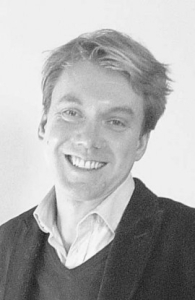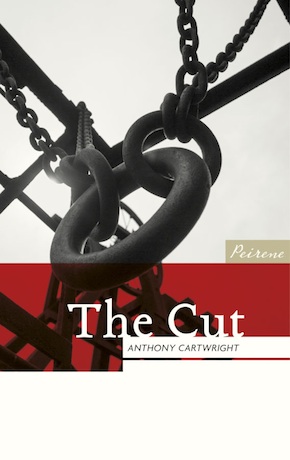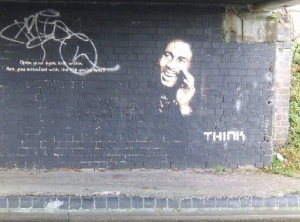A new day
by Anthony CartwrightThe young woman runs burning along the side of the marketplace, down the High Street, away from the fountain. Away from the fountain and the cool, litter-strewn water. She is tall, long-legged. Her hair is ablaze and flames spit from an unravelling scarf towards the motley crowd of people who give chase. Someone is screaming, but it is not the woman. She breathes fire. There is the slap of cheap sandals on the pavement behind her.
“Stop her,” someone shouts. “Just fucking stop her.”
A man runs at the edge of the crowd, a camera on his shoulder, filming, does not stop the running woman. The procession ripples across shop windows and puddles from the earlier rain. Then she falls, arms and legs and flames, and the men and women and kids crowd around her, with their heads bowed, their arms across their faces against the smell of burning hair, burning flesh. The scarf melts into the young woman’s face. The people roll her on the ground, with some sense of what to do. What to do if a woman comes running through the market on a Friday afternoon in the middle of England with her head on fire.
Cairo is hit from behind and keels forward so that he watches this side on, his head on the slabs, through fire and smoke, heat, the world watery in his eyes, and jagged and half-formed. There are people running. He feels the blows as they strike him, watches through their arms and legs.
A woman on her mobility scooter, an outrider of the chase, takes a blanket from her lap. The people wrap the burning woman in this and a lad’s red tracksuit top. The clothes begin to stick to her. And the people bicker about whether they are doing the right thing. They bend on either side of the fallen woman, rock her gently. Others gather with phones raised and aimed in witness. There are sirens now. One of the attendant men stands, stumbles and coughs, heaves into the gutter and sits down on the kerb, the cuffs of a torn work shirt rolled back and his burnt hands held out in front of him.
The woman on the mobility scooter beckons towards the man with the camera on his shoulder, who continues to film, and he approaches her, still filming. She pulls herself up, looks into the camera, which sees her soft, round English face twist behind her glasses, and she spits hard at the lens.
The taste of ash, burnt flesh.
There is a blackened stump in his mouth. And darkness, then light, darkness then light, in the pattern of flames against a dark hillside, the pattern of lights across a dark plain under hills.
To begin again, the day, his life, to begin.
***
The day begins with rain and Cairo curses it, wills it to stop. He holds his ankle support in his hand and looks at the trees through the bedroom window, the rain-dashed glass. Even with the weather this morning and a stiffness in his legs, he feels a sense of pulling through. He was always a stayer. When he phoned Jamie Iqbal the man had not said no.
“You must be forty-five years old, Cairo. I don’t think I have ever heard anything like this in my life,” Jamie said to him.
They had barely spoken for – what? – ten years. Except for that one night at the restaurant with Grace. Cairo tries not to think about that.
“Thirty-eight. I’m thirty-eight,” he said to Jamie.
He has not been thirty-eight for a good while, but forty-five is taking the piss. He knows they change names, ages, everything – you become someone new – at Jamie Iqbal’s nights. It’s not as if he wants his licence back. He tells himself he is not a fool, wonders whether in the telling there is some foolishness he cannot fathom.
The boy’s fists are curled tight, his face serious in sleep, the flicker of his eyes beneath thin lids. A beautiful, dreaming boy, strong-looking, solid and real. Not like the other child in his head, unformed, spectral.”
He moves through the quiet rooms, the sound of a family asleep. Through the half-open bedroom door he sees the cot, the mobile that he sat up late to put together, zoo animals suspended in morning light. He steps into the room, aware of the creak of the floorboards, the sagging house. The boy’s fists are curled tight, his face serious in sleep, the flicker of his eyes beneath thin lids. A beautiful, dreaming boy, strong-looking, solid and real. Not like the other child in his, Cairo’s, head, unformed, spectral.
His daughter stirs in the bed, turns, her mouth open and her shoulders bare, still asleep, and Cairo steps backwards, out of the door, and stands there on the landing to wait and see if he has woken them, and wonders if he can do anything else right now except let them sleep a little longer.
If the fight is to take place it will be in Birmingham, not far from the Villa, at an abandoned furniture showroom by the Perry Barr dogs, now that Jamie has closed the restaurant. Cairo takes it as a good omen, enjoyed fighting in Birmingham as a kid. This new place has white-collar bouts and unlicensed meetings on the first Friday of the month. How white-collar boxing differs from that of his own people Cairo is not sure. He is blue collar. He is possibly no collar. This is something he would like to say to Jamie, something he would have liked to have said to Grace had things been different. She would’ve laughed. He woke thinking he
heard a baby cry out, and perhaps it was Zach, and Stacey-Ann comforted him in the time it took Cairo to wake, silence in the house when he sat up and listened, and perhaps it was that other baby calling out from somewhere else.
Carefully he walks down the stairs. One foot in front of the other is how to do it.
“You said you thought I could still handle meself.”
“Thass a figure of speech, Cairo. Jesus.”
“Just come and have a look. See what yer think,” he said.
“I cor believe I’m bloody listenin to yer.”
“You know yer can trust me, Jay. You know that much.”
“How many years is it, Cairo, how many?”
“Honest to God.”
“How’s yer ode mon?” Jamie’s voice softened.
“Older.”
“Jesus, it’s me that wants their head lookin at, not yow.”
“You know yer can trust me, Jay. Just come and have a look.”
And that’s how they’d left it, had exchanged texts. Before Cairo smashed up his phone, that is. Jamie will come, Cairo knows it. It is this thought now that gets him up the hill, early mornings, late nights if he can, depending on work and his aching bones.
From the kitchen window he watches the fox go over the back fence with a scrabble of claws in the grey light. Maybe he didn’t hear a baby but instead the fox in the night. There are no ghosts, he tells himself, doubts this even as he thinks it.
Cairo pulls back the net curtain, lets his finger pattern the condensation. He drinks slowly from his water bottle, the taste of old gyms somewhere in it. Blood in water. There is a whole history of men who got beaten up, knocked senseless, in order to pay the rent, put food on the table, one of the many histories buried in the hill. He tells himself he is part of a proud Dudley tradition.
***
A face looms from the dark and then is gone, his face, it was his face. But how could that be? There are voices that come through the permanent night, soothing and calm, though she doesn’t know what they say. She lies, suspended, is not sure where her body might be, nor the body that grows inside her own, swimming in the dark, no sense of the shore, no sense of the surface, but it is calm and there is no pain. She drifts, thinks of tiny creatures fixed in amber for thousands of years.
Grace swims in the morning, when she should’ve been packing her bags, in the arboreal light of the Ladies’ Pond. She loves the word arboreal, loves this place, and turns to watch the clouds through the trees, moves into a cool, dark channel in shadow, near the bank, then out again into sunlight. She has one bag packed, of course, but no passport or papers inside it. No euros or forints or dinar wrapped carefully in envelopes. She remembers she must show Zara where these are, in the small safe in the corner of the studio, and that she must give her the codes. She will not return there after this morning. She wants a clean break.
That Grace found the pictures so beautiful, the stillness of the images, the depth of the colours, the incongruity of what the words described when anyone spoke, appals her now, makes her feel ashamed.”
Zara and the crew will be flying to Budapest, then onwards in jeeps from there, towards the border, always this crossing of borders, real or imagined. The idea is to return to the towns and villages they’d filmed before, in their first film, the one that won the award and has kept them in work these last few years, villages in corners of the Balkans. They told a story of how people left and how new people came, recorded daily life going about its business, women making burek filmed through open windows, old men herding goats, timeless but fractured somehow. Sometimes they got people to talk: “We came here when we had to leave our old homes.” They told stories of movement and place and great violence. That she, Grace, found the pictures so beautiful, the stillness of the images, the depth of the colours, the incongruity of what the words described when anyone spoke, and that other people felt the same, appals her now, makes her feel ashamed. This is not a feeling she has ever considered before: shame. Like something from a distant century, a forgotten civilization, something talked about in films of faraway places.
The sun makes a path of light across the surface of the pond. Grace suddenly sees herself again as a girl at the end of the lane near her grandparents’ house, where she’d go after school to drink cocoa or cordial. Cocoa and cordial: two things and words of which her grandmother was fond. Her grandmother who also had swum here in the pond. And as a young woman she had swum in the Thames, of course, called it the Isis, as Grace had, and her mother had too. And as a young girl her grandmother swam in the Shannon, daughter of Empire. They have a tea set in the attic at home, come all the way from India in a trunk, the tiniest spidery cracks in the china.
But first Grace has to finish her current project, one way or the other, will go back today, last images, not to the middle of Europe but to the middle of England. And then she’ll see.
From The Cut
 Anthony Cartwright was born in Dudley in 1973. He is the author of four previous novels, most recently Iron Towns (Serpent’s Tail, 2016). His first three novels were shortlisted for various literary awards. The Cut is out now in paperback from Peirene Press.
Anthony Cartwright was born in Dudley in 1973. He is the author of four previous novels, most recently Iron Towns (Serpent’s Tail, 2016). His first three novels were shortlisted for various literary awards. The Cut is out now in paperback from Peirene Press.
Read more.



